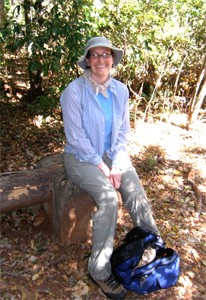
Plants Keep Spines Long After Their Grazer Went Extinct
Evidence for evolution lasts long after the cause for evolution disappears. That is one of the conclusions reached in a new paper by Brooke E. Crowley of University of Cincinnati and Laurie R. Godfrey of the University of Massachusetts, Amherst.
Their paper, Why all those spines? Anachronistic defenses in the Didiereoideae against now-extinct lemurs, was published Tuesday, Jan. 29, by the South African Journal of Science.
Crowley and Godfrey have worked extensively in Madagascar, particularly in the very dry southern part of that island.
Almost all the plants there are spiny, Crowley said, and that raises questions because spines have a real cost to the plant. Plants should only grow spines when it is worth the expenditure of energy and nutrients. This is particularly true for spiny succulents, like the endemic Didiereoideae, which typically grow very slowly.
Usually, Crowley said, spines are a sign that some animal is eating the plant. Plants that grow spines are able to resist or slow browsing and survive to reproduce.
However, very few animal species consume Didiereoideae today, she said. The vertebrate community of Madagascar has experienced a dramatic decline over the past 2000 years.
Perhaps, Crowley and Godfrey reasoned, animals that are now extinct consumed the spiny plants.
These spiny succulent plants live only in Madagascar, Crowley said. They are close relatives of succulents, including the jade plant, found on mainland Africa, but the African plants have no spines.

Alluaudia procera
This suggests that the plant-eating animals were unique to Madagascar. Among the potential now-extinct plant-eaters of Madagascar are lemurs, tortoises, pygmy hippopotamuses and elephant birds. Of these, only lemurs are likely candidates, because the spiny plants are fairly tall and none of the other extinct candidates could climb or fly.
How can a researcher prove that an extinct animal ate a particular plant? Crowley relied on ratios of carbon and nitrogen isotopes to assemble chemical profiles to distinguish the Didiereoideae from other succulent plants, grasses, trees and herbs.
She then extracted collagen from the bones of extinct and extant animals and traced the tell-tale chemical profiles of different sorts of plants.
Our results suggest that several of the extinct lemurs, particularly a species named Hadropithecus stenognathus, may have relied heavily on these spiny plants, Crowley said.
The isotopic evidence reveals that no other animals fed on these spiny plants to any significant extent. Because the lemur species that ate the spiny plants are now extinct, the plants may no longer require spines for protection.
Our data support the conclusions that the herbivores exploiting the leaves of these plants were largely climbing lemurs, and that the loss of giant climbing lemurs has rendered the spines of these plants increasingly anachronistic, Crowley said.
Although the defences are no longer necessary for the survival of todays plants, evidence for evolutionary adaptation persists.
Related Stories
UC offers experiential learning abroad in Central America
April 19, 2024
In the tropical paradise of Costa Rica, fourth year journalism and international affairs student Stephanie Rivera embarked on an unforgettable journey of self-discovery and cultural immersion. Leaving behind the familiar sights and sounds of Cincinnati, Rivera set out to study abroad for a transformative semester in this Central American country, rich with vibrant biodiversity and cultural heritage. The College of Arts & Sciences (A&S) at UC places great emphasis on encouraging study abroad and experiential learning opportunities for its students. Recognizing the transformative power of global experiences, the college supports a variety of study-abroad programs that enable students to enhance their academic pursuits while gaining valuable cultural and personal experiences.
WVXU: Test your word puzzle skills with a Cincinnati...
April 18, 2024
Cincinnati edition host Lucy May discusses the history and new found popularity of word games with Michael Griffith, professor English. Griffith is a writer, but also develops word games for publication.
Jason and Travis Kelce take Cincinnati to ‘New Heights’
April 16, 2024
UC alumni Jason and Travis Kelce returned to UC for an unforgettable evening that included the Great "Lombaby" Games, a live recording of their podcast "New Heights," special guests Joe Burrow, Orlando Brown Jr. and Desmond Ridder and a surprise commencement ceremony.
